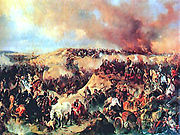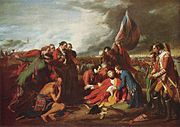
1759
Related subjects: Years
About this schools Wikipedia selection
SOS Children volunteers helped choose articles and made other curriculum material A quick link for child sponsorship is http://www.sponsor-a-child.org.uk/
| Millennium: | 2nd millennium |
|---|---|
| Centuries: | 17th century – 18th century – 19th century |
| Decades: | 1720s 1730s 1740s – 1750s – 1760s 1770s 1780s |
| Years: | 1756 1757 1758 – 1759 – 1760 1761 1762 |
| 1759 in topic: |
| Subjects: Archaeology – Architecture – |
| Art – Literature ( Poetry) – Music – Science |
| Countries: Canada – Great Britain – United States |
| Leaders: State leaders – Colonial governors |
| Category: Establishments – Disestablishments |
| Births – Deaths – Works |
Year 1759 (MDCCLIX) was a common year starting on Monday (link will display the full calendar) of the Gregorian calendar (or a common year starting on Friday of the 11-day slower Julian calendar).
Events of 1759
January – June
- January 6 – George Washington marries Martha Dandridge Custis.
- January 11 – In Philadelphia, Pennsylvania, the first American life insurance company is incorporated.
- January 13 – The Távora family is executed following accusations of the attempted regicide of Joseph I of Portugal.
- January 15 – The British Museum opens (after 6 years of development).
- April 14 – Seven Years War – A French army defeats Ferdinand, Duke of Brunswick at the Battle of Bergen.
- June 27 – Seven Years War ( French and Indian War) – British Troops under Jeffrey Amherst take Fort Ticonderoga.
July – December
- July 25 – Seven Years' War ( French and Indian War): In Canada, British forces capture Fort Niagara from French, who subsequently abandon Fort Rouillé.
- July 26 – Seven Years' War ( French and Indian War): At the southern end of Lake Champlain, British forces capture Fort Carillon from French, and rename it Fort Ticonderoga.
- August 1 – Battle of Minden – Anglo–Hanoverian forces under Ferdinand of Brunswick defeat the French army of the Duc de Broglie, but due to the disobedience of the English cavalry commander Lord George Sackville, the French are able to withdraw unmolested.
- August 10 – Ferdinand VI of Spain dies and is succeeded by his half–brother Charles III. Charles resigns the thrones of Naples and Sicily to his third son, Ferdinand IV.
- August 12 – Battle of Kunersdorf – Frederick the Great is rebuffed in bloody assaults on the combined Austro–Russian army of Pyotr Saltykov and Ernst von Laudon. This is one of Frederick's greatest defeats.
- August 18 – Battle of Lagos – The British fleet of Edward Boscawen defeats a French force under Commodore Jean-François de La Clue-Sabran off the Portuguese coast.
- September 10 – Battle of Pondicherry – An inconclusive naval battle is fought off the coast of India between the French Admiral d'Aché and the British under George Pocock. The French forces are badly damaged and returned home, never to return.
- September 13 – Seven Years' War ( French and Indian War): Quebec falls to British forces following General Wolfe's victory in the Battle of the Plains of Abraham just outside the city. Both the French Commander (the Marquis de Montcalm) and the British General James Wolfe are fatally wounded.
- November 20 – Battle of Quiberon Bay – The English fleet of Sir Edward Hawke defeats a French fleet under Marshal de Conflans near the coast of Brittany. This is the decisive naval engagement of the Seven Years' War – after this, the French are no longer able to field a significant fleet.
- November 21 – Battle of Maxen – the Austrian army of Marshal von Daun cuts off and forces the surrender of a Prussian force under Friedrich von Finck.
- December 6 – The Germantown Union School (now called " Germantown Academy"), America's oldest nonsectarian day school, is founded.
Undated
- Adam Smith publishes Theory of Moral Sentiments, embodying some of his Glasgow lectures.
- Voltaire's Candide is published.
- The town of Egedesminde (modern Aasiaat) is founded in Greenland.
- The Famous Guinness Brewery founded in St. James's Gate, Dublin Ireland.
- Churton Town, the Orange County, North Carolina county seat laid out in 1754, is renamed Childsburgh in honour of North Carolina attorney general Thomas Child. It is later renamed Hillsborough in 1766.
- Fire destroys 250 houses in Stockholm.
- French government authorizes Madame du Coudray to carry her instruction "throughout the realm" and promises financial support.
Ongoing events
Births
| Gregorian calendar | 1759 MDCCLIX |
| Ab urbe condita | 2512 |
| Armenian calendar | 1208 ԹՎ ՌՄԸ |
| Assyrian calendar | 6509 |
| Bahá'í calendar | -85–-84 |
| Bengali calendar | 1166 |
| Berber calendar | 2709 |
| British Regnal year | 32 Geo. 2 – 33 Geo. 2 |
| Buddhist calendar | 2303 |
| Burmese calendar | 1121 |
| Byzantine calendar | 7267–7268 |
| Chinese calendar | 戊寅年十二月初三日 (4395/4455-12-3) — to — 己卯年十一月十三日(4396/4456-11-13) |
| Coptic calendar | 1475–1476 |
| Ethiopian calendar | 1751–1752 |
| Hebrew calendar | 5519–5520 |
| Hindu calendars | |
| - Vikram Samvat | 1815–1816 |
| - Shaka Samvat | 1681–1682 |
| - Kali Yuga | 4860–4861 |
| Holocene calendar | 11759 |
| Igbo calendar | |
| - Ǹrí Ìgbò | 759–760 |
| Iranian calendar | 1137–1138 |
| Islamic calendar | 1172–1173 |
| Japanese calendar | Hōreki 9 (宝暦9年) |
| Juche calendar | N/A (before 1912) |
| Julian calendar | Gregorian minus 11 days |
| Korean calendar | 4092 |
| Minguo calendar | 153 before ROC 民前153年 |
| Thai solar calendar | 2302 |
- January 25 – Robert Burns, Scottish poet (d. 1796)
- February 15 – Friedrich August Wolf, German philologist and archaeologist (d. 1824)
- February 22 – Claude Lecourbe, French general (d. 1815)
- 27 April – Mary Wollstonecraft, feminist author (d. 1797)
- May 20 – William Thornton, American architect (d. 1828)
- May 28 – William Pitt the Younger, statesman and Prime Minister of the United Kingdom (d. 1806)
- June 21 – Alexander J. Dallas, American statesman and financier (d. 1817)
- August 24 – William Wilberforce, British abolitionist (d. 1833)
- September 19 – William Kirby, English entomologist (d. 1850)
- October 25 – Sophie Marie Dorothea of Württemberg, empress of Paul I of Russia (died November 5, 1828)
- October 25 – William Wyndham Grenville, 1st Baron Grenville, Prime Minister of the United Kingdom (d. 1834)
- October 26 – Georges Danton, French Revolutionary leader (d. 1794)
- November 10 – Friedrich Schiller, German writer (d. 1805)
Deaths
- January 12 – Anne, Princess Royal and Princess of Orange, regent of Friesland (born 1709)
- March 11 – John Forbes, British general (born 1707)
- April 6 – Johann Gottfried Zinn (born 1727)
- April 14 – George Frideric Handel, German composer (born 1685)
- May 12 – Lambert-Sigisbert Adam, French sculptor (born 1700)
- July 27 – Pierre Louis Maupertuis, French mathematician (born 1698)
- August 6 – Eugene Aram, English philologist (born 1704)
- August 8 – Carl Heinrich Graun, German composer (born 1704)
- August 10 – King Ferdinand VI of Spain (born 1713)
- August 24 – Ewald Christian von Kleist, German poet (born 1715)
- September 10 – Ferdinand Konščak, Croatian explorer (b. 1703)
- September 13 – James Wolfe, British general (born 1727)
- September 14 – Louis-Joseph de Montcalm, French general (born 1712)
- October 13 – John Henley, English minister (born 1692)
- november 14- Grégoire Orlyk, Ukrainian-born French Lieutenant General (b. 1702)
- November 29 – Nicolaus I Bernoulli, Swiss mathematician (born 1687)
- date unknown – King Thipchakre of the Realm of Lampang




